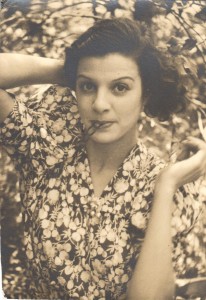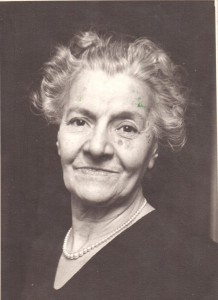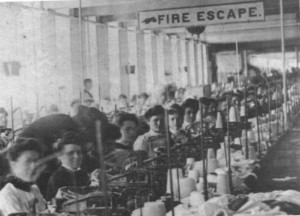Justine’s Story (starting out and growing up)
Coincidentally, in 1912, two children, Justine and Carl, were attended the 1st grade class of the Public School on Arch Street in West Philadelphia, Pennsylvania. Although they each remember the classroom, neither of them made enough of an impression on the other to be memorable and it may have stayed that way forever. My parent’s life trajectories would only truly intersect in the mid 1930’s under circumstances that could hardly have been envisioned in the second decade of the 20th century.
By 1925 my father was eighteen and happily building radio sets in his bedroom in Stamford, Connecticut as he waited to begin college. In 1925 my mother was almost twenty, living in New York City and had been out working for more that five years.
As the first born to French immigrants my mother, Justine, took on the role of ‘man of the house’ when her father, Georges, left his wife, Isabella, and two other daughters. With The Great War over, Georges Ponthus was able to return to France in safety, taking the third and youngest daughter, Juliana, with him. Isabella never saw her daughter again. It would be more than forty years before the sisters would meet again. My grandmother never thought in anything but French and even the little English she spoke was difficult to follow.
Living in New York City in the early days of the automobile, Georges had hired himself out to those who could afford a vehicle and a chauffeur/mechanic to drive and maintain it. Isabella’s living came from those woman who could afford to have their wardrobe created by a “french” couturier. By leaving his family Georges made it necessary for Justine to quit school and find work. With her mother’s English limited to words useful in the millinery trade, Justine had taken over the family’s negotiations with grocers, landlords and tradesmen. And, at fifteen, she chaffed at the dominion Isabella exerted over her remaining children and was probably anxious to assert her personal autonomy as justified by her role managing the household. No doubt Isabella, now abandoned, bore strong opinions about marriage and men in general which she shared with Justine and her remaining sisters as they grew up… and after.
My grandmother, as I remember her, in the early 1940’s seemed very tall, even when she held me in her lap and sang to me in French. Justine and her sister, Juliet, were off at work. I was her first grandchild and we bonded deeply. My father was off to the war in Europe.
Maman must have had the demeanor of a Mother Superior to her novice daughters although she had long since stopped going to mass. I called her “Maman,” when I was old enough to speak. Maman had married late to Georges, a man ten years her junior. The three remaining daughters married late, too. This was no doubt due to the scrutiny their now abandoned mother accorded any suitor who came calling.
During the 1920’s, Justine worked exclusively in the lampshade industry. The custom design and manufacture of fabric shades with linings of silk, was a specialty and depended on a clientele affluent enough to avoid the mass produced and choose the made to order. Eventually, she would supervise the younger and less experienced girl who sweated in these factory lofts and stitched away on expensive fabrics stretched over the metal armatures of custom designs.
Thinking about her at work in these lofts brings to my mind the Triangle Shirtwaist Company and the working environment there. The disastrous fire on Waverly Place in 1910, had taken place barely a decade before.
When I used to pester her about, “How things used to be,” Justine described her family living in a series of apartments in those days. One seemed especially suitable to their situation. It was on Madison Avenue near 68th Street. Formerly a residence, the grey painted brownstone building now had a storefront shop on the street level. Above, floor through apartments had been created on each floor to provide living space in the back with the front room serving as a business premises during the day. Many of these buildings exist in this form even now.
From this second floor apartment Mme Ponthus’ atelier looked out on Madison Avenue and the shops, two-way street traffic and trolley line below. With Justine off at work and her sisters at school, she would receive her clients in the afternoons for fittings, tea, conversation and gossip. The relationship between a woman and her dressmaker was part commerce, part ritual and very personal. Maman was an artiste with fabric and trimmings. She also had a way with cards and the superstitions of a French peasant in matters supernatural.
I would ask Justine questions about how her life was before I became a part of it, but I was too young to ask questions like: “What did you want to be when you grew up?” Now that I would like to pose these and other questions, it’s too late. So I have to put things together as best I can from bedtime stories or when I was bedridden with a childhood illness and needed distraction and comforting.
I remember her saying that her mother wouldn’t let her daughters going out at night. But as the eldest sister and breadwinner she was able to standup to her parent from time to time. Justine told me she liked to get out of the apartment in the evening and wander around Central Park which was only a block away. She said the park was filled with strollers on summer evenings in the time before air conditioning. She had no fear of walking unescorted.
But Maman had a weakness. She loved the theater. Fortunately, one of her clientele was connected to show business in some way and tickets to shows would suddenly appear. Whether in preview with producers needing an audience, or during the run, the family could be counted on to fill four seats with Isabella and three well dressed and enthusiastic young ladies glad to be out of the apartment. I’m sure the mother, with her limited English, had little use for Eugene O’Neill and heavy drama. But she loved the dancing and singing musicals popular in the twenties. And they might see a show more than once.
My mother took her taste from her mother. I remember Justine passing on to me the thrill at witnessing performances of the first Broadway production of Shuffle Along.
One of the show stopper songs, “I’m Just Wild About Harry,” was part of her acapella repetoire as I was growing up. Justine later thought the reason this tune stuck in her mind was the Philadelphia neighborhood they lived in during the heyday of ragtime. Every row house seemed to have a piano and music and singing floated down the alleys and over the backyard fences. Of course, “I’m Just Wild About Harry” became Harry Truman’s campaign song in 1948, reviving Justine’s memories of her younger self in time for me to hear her singing it all over again. I also remember ‘Tooot-toot, Tootsie, Goodbye,” when she was preoccupied and happy… and Thought no one was listening.
Most evenings though the three sisters sat at the kitchen table and played card games while Maman played solitaire at a card table of her own. Sometimes the younger girls would go to their mother; “Faites les cartes, Maman,” they would enjoin. “Faites les cartes pour Mousieur Lenoir.” She would finish the hand she was playing and then would deal out the cards, some face up, some face down. She would then tell the future for some acquaintance or a person in public life by moving the cards about the table; revealing some, hiding others and discarding others into a pile. After a while of this manipulation Madame Ponthus would deliver her revelations recited a quiet undertone. The theatricality of the séance was that it was done in such a low key manner. She had pretty good reviews for her little performance. She often let herself be persuaded to, “Faites les cartes,” by the women who were there for fittings, tea and a bit of mumbo jumbo. For these women she sometimes added the gimmick of having them write the name of the person for whom the cards were to be read. The piece of paper was folded and placed untouched and unread by Madame opposite her place at the table before the cards could be shuffled and dealt. Was my grandmother a grifter?
My mother had a bedtime story I delighted in and demanded to hear told, frequently. I called it- “Maman dit, ‘Rien, rien du tout.’”
As Justine would tell it to me the story would go:
One day Mrs. Boudreau came to Mme Ponthus for a final fitting. Maman had made her a lovely dress and had fashioned a matching hat and a veil to go with it.
Mrs. Boudreau was very pleased and Mme Ponthus served them both tea. After they had enjoyed drinking the tea and eaten from a small cake the talk turned to a “Mrs. Blanchard,” a woman they both knew and had not seen or heard from for some weeks. Had she gone away? Was she angry with them both? What to do?
“Aha,” said Mrs. Boudreau, “Faites les cartes, Madame. Faites les cartes.”
As Mme Ponthus made the cards for the first time a frown crossed her face.
“What do you see?” said Mrs Boudreau as Mme Ponthus reshuffled the cards
Without answering Mme Ponthus made the cards a second time.
“What is it?”
Still without answering and with great concentration Madame Ponthus made the cards a third time.
“What is wrong?”
Finally Mme Ponthus replied: “Rien. Rien du tout.”
At this point my mother indicated that the finality of her reply was accompanied by a rumble of thunder and that Mrs. Boudreau left Mme Ponthus before it began to rain. My mother would dramatize each rendition with all the trappings of a fairy story and would end by saying to her entranced little boy:
“And do you know what happened? Within a week both women would learn that Cecile Blanchard had died at the moment that Mme Ponthus was trying to tell her future and could only see, “Nothing. Nothing at all.”
These circumstances continued as the reasonably good life they enjoyed saw the end of the 1920’s. With the coming of The Great Depression the modest life style I have described was dramatically changed for my grandmother and my mother — and of course her sisters too.



